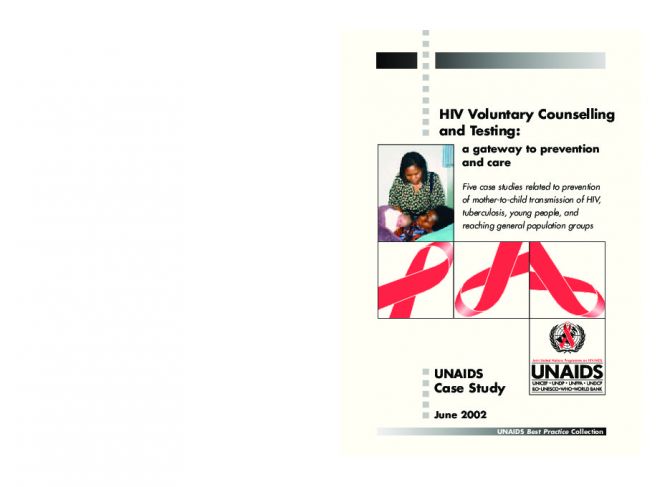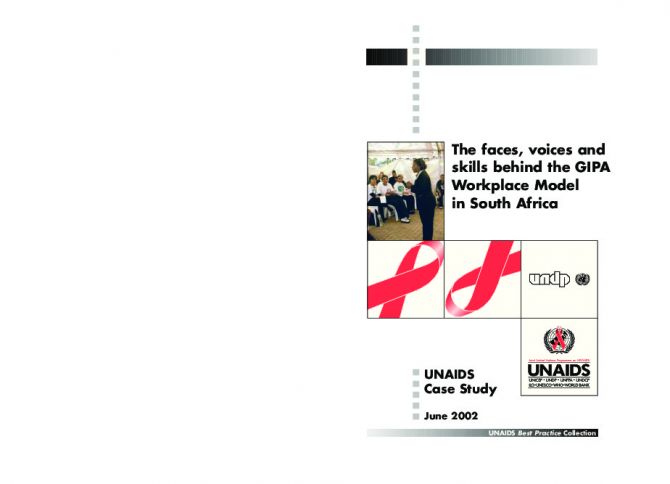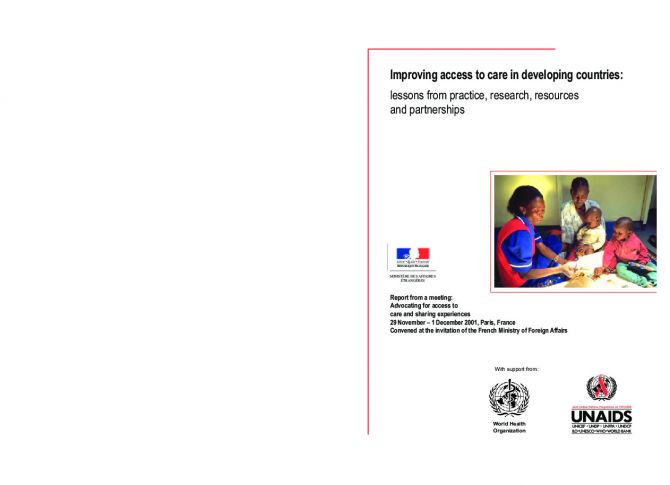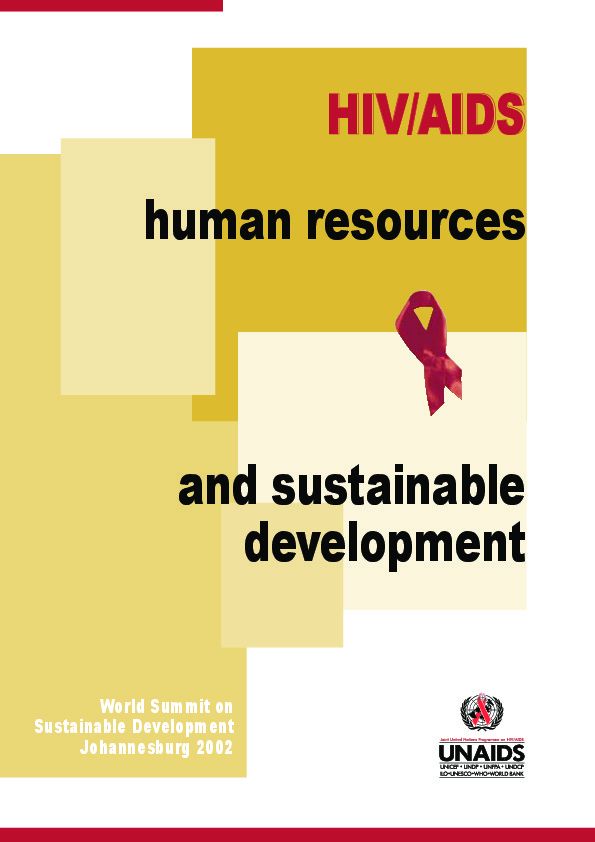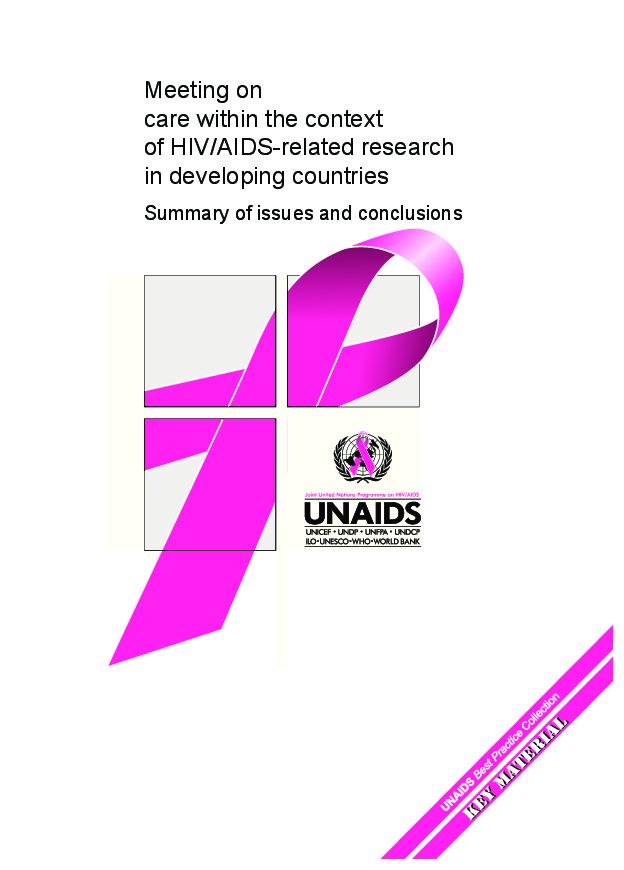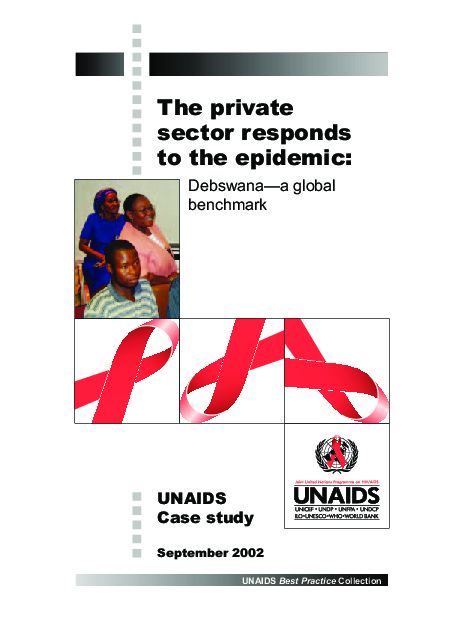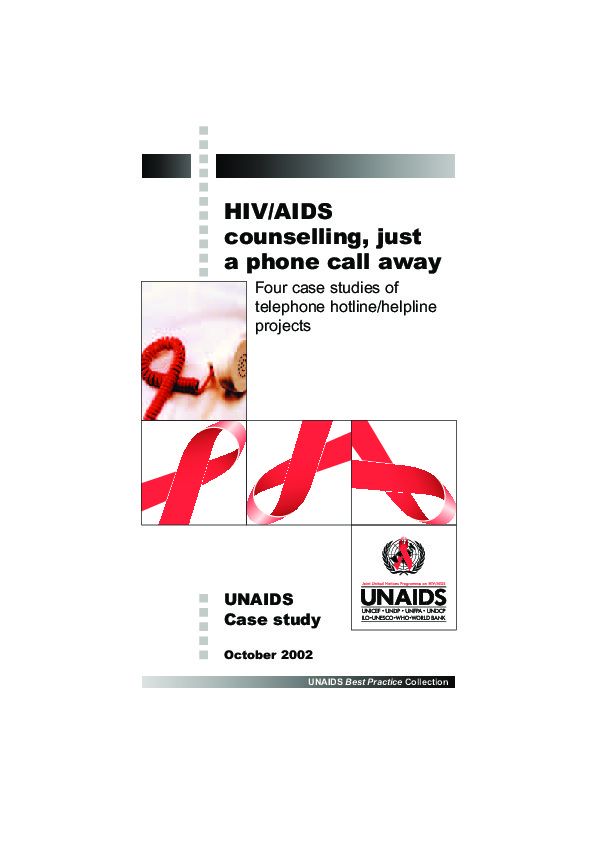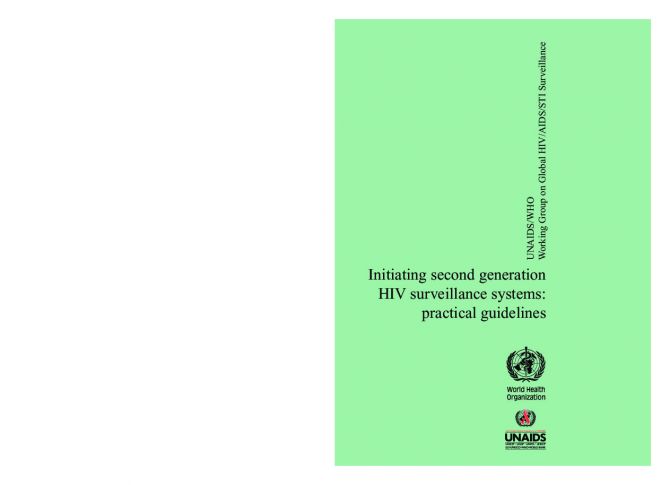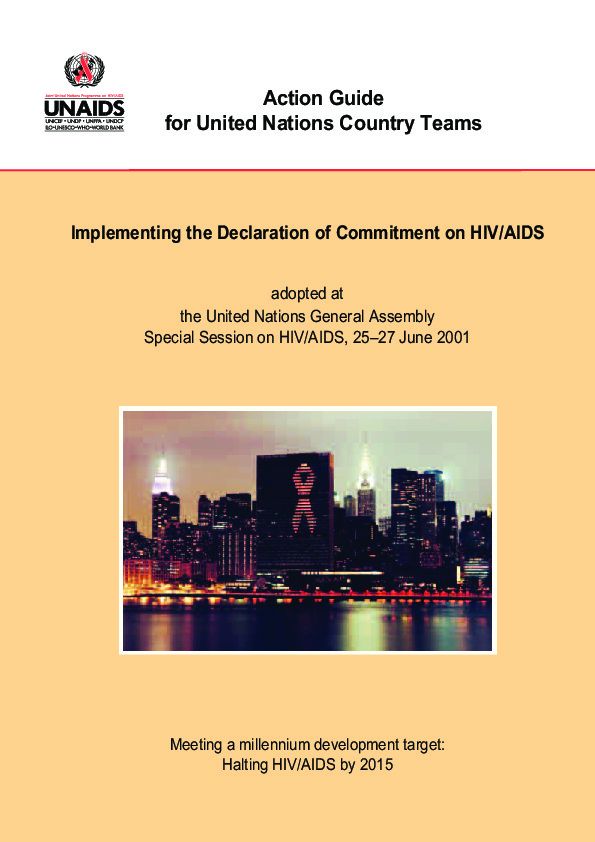Documents
HIV voluntary counselling and testing : gateway to prevention and care. Five case studies related to prevention of mother-to-child transmission of HIV, tuberculosis, young people, and reaching general population groups
05 July 2002
HIV voluntary counselling and testing (VCT) is the gateway to both prevention and care, playing an important role in helping people to change their sexual behaviour and thus reduce HIV transmission. VCT services are being more widely promoted and developed and many countries are gradually instituting VCT as part of their primary healthcare package. The aim of this booklet is to describe the experiences of, and challenges faced by, five programmes in sub-Saharan Africa, which developed effective practices and implemented successful approaches to VCT in relation to four key thematic areas: prevention of mother-to-child transmission (PMTCT); tuberculosis (TB); young people; and general population groups. The programmes operate in low-resource settings and many of the experiences and lessons learnt may be transferable beyond country and culture, and strengthened through community mobilization and public policy measures. This booklet highlights the need for VCT not to be seen as a uniform intervention but as a flexible service that can be adapted to the needs of the population it serves.
Documents
The faces, voices and skills behind the GIPA Workplace Model in South Africa : UNAIDS case study
05 July 2002
South Africa has begun to explore how best to involve people living with HIV/AIDS in making more effective workplace responses to the HIV/AIDS epidemic. This Case Study reports on a pilot programme—the GIPA Workplace Model—which has been developed over the past four years with United Nations support. The project’s aim is to place trained fieldworkers, living openly with HIV/AIDS, in selected partner organizations in different sectors (government departments, private companies and corporations) so that they could set up, review or enrich workplace policies and programmes.
Documents
Improving access to care in developing countries : lessons from practice, research, resources and partnerships. Report from a meeting : advocating for access to care and sharing experiences, 29 November – 1 December 2001, Paris
08 July 2002
These background papers collate analyses on key issues and lessons learnt in the implementation of the care agenda. They are the product of 12 months of consultations initiated by the French Ministry of Foreign Affairs, with over 150 specialists representing a broad range of fields relevant to providing care for people living with HIV/AIDS. This publication features contributions from experts that reflect the breadth of a Technical Network on Access to Care. The papers were the background to the Declaration for a Framework for Action: Improving Access to HIV/AIDS Care in Developing Countries which was adopted on 1 December 2001 at a meeting held in Paris, convened at the invitation of the French Ministry of Foreign Affairs with the support of the UNAIDS Secretariat and the World Health Organization (WHO).
Documents
Paediatric HIV Infection and AIDS : UNAIDS point of view
14 August 2002
This Best Practice document examines how children become infected with HIV; what can be done to prevent infection in children, which includes health education and the prevention of mother-to-child transmission; and, finally, the various ways of reducing the impact of HIV on children (such as promoting early awareness, improving diagnostic facilities, providing vitamin A supplementation and immunization).
Documents
HIV/AIDS, human resources and sustainable development : World Summit on Sustainable Development, Johannesburg 2002
21 August 2002
Sustainable development implies a balance between environmental and economic and social development. The devastation of the AIDS epidemic is draining the human and institutional capacities that fuel sustainable development. The report concludes that social and economic strategies are more likely to eradicate poverty and achieve sustainable development if they meet the challenges posed by the AIDS epidemic.
Documents
Meeting on care within the context of HIV/AIDS-related research in developing countries : summary of issues and conclusions, 26-28 May 1999, Geneva
05 November 2002
In May 1999, UNAIDS convened a meeting on ‘Care within the context of HIV/AIDS-related research in developing countries’ as part of a series of consultations on the ethics of vaccine trials and biomedical research. The meeting’s objectives were to develop a framework of care for participants in HIV/AIDS-related research in developing countries, as well as to clarify the appropriate responsibilities of the research institutions, health-care professionals, sponsors, communities and governments in the context of research ethics. This report is a summary of the issues discussed at the meeting and the conclusions reached, which included the agreement that the participants’ health and well-being must be the primary concern during HIV-related research and that this concern should prevail over any other concerns, including the interest of science. Based on this summary and the subsequent developments, UNAIDS (in partnership with its collaborators) will consider the development of a guidance document regarding the provision of care in HIV/AIDS-related research.
Documents
The private sector responds to the epidemic : Debswana, a global benchmark : UNAIDS case study
05 November 2002
In many respects, Botswana is Africa’s success story. It is peaceful, democratic and prosperous. But it also has the worst AIDS epidemic in the world, with an adult prevalence rate estimated at 35.8%. This case study describes the response to this tragedy (which threatens to reverse all the country’s gains of the past decades) of one of the most important companies in Botswana—the Debswana diamond-mining company. The company started with an AIDS education and awareness programme, appointed full-time AIDS programme coordinators and developed an HIV/AIDS management policy. It conducted an institutional audit of susceptibility and vulnerability to HIV/AIDS, which is reported in some detail, together with findings and lessons learned. Debswana’s work on HIV/AIDS represents a ray of hope in a bleak situation and has much to teach the private sector in the region and, perhaps, globally.
Documents
HIV/AIDS counselling, just a phone call away : Four case studies of telephone hotline/helpline projects
11 November 2002
Telephone helplines (also known as hotlines) are telephone lines set up to take calls from people seeking information on specific topics—such as (in the case of this Best Practice study) HIV/AIDS. Four programmes were chosen to illustrate the Best Practice criteria for helplines: the AIDS Helpline of South Africa’s Department of Health, the reproductive health and sexuality helpline offered by a New Delhi-based nongovernmental organization (NGO) called Talking about Reproductive and Sexual Health Issues (TARSHI), the National AIDS Hotline of Trinidad and Tobago, and the hotline run by Remedios AIDS Foundation of Manila, the Philippines. Together, they illustrate the principles that make helplines so successful in providing HIV/AIDS information and counselling, the challenges helplines face, and the creative approaches that can be taken to meet those challenges.
Documents
Initiating second generation HIV surveillance systems : practical
10 December 2002
The purpose of the guidelines is to assist National AIDS Programmes (NAPs) and Ministries of Health in implementing second generation HIV surveillance systems through a logical and standardized process. More specifically, the guidelines are primarily addressed to programme managers, epidemiologists, social scientists and other experts working in or with national programmes on surveillance issues. They include the following: assessment, consensus, plan and protocol development, implementation and, finally, monitoring and evaluation.
Documents
Action Guide for United Nations Country Teams : implementing the Declaration of Commitment on HIV/AIDS, adopted at the United Nations General Assembly Special Session on HIV/AIDS
16 December 2002
The guide is designed to help country teams assist national governments in implementing the Declaration. It is based on 3 principles: implementation is a collective responsibility; the emphasis is on strengthening existing capacities, mechanisms and processes, and the Declaration is a unifying, motivational tool.

